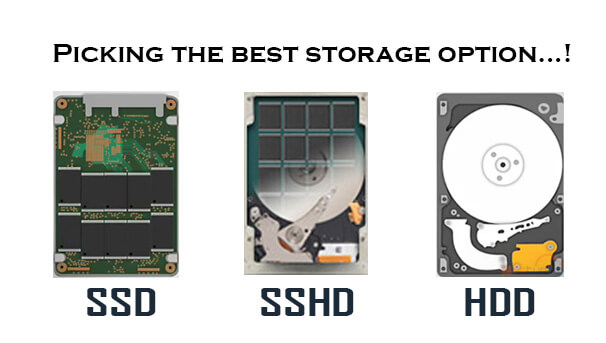
If you’re searching to buy a new device as a laptop or computer, or just get a new hard disk to help your computer run smoothly. Today I would like discuss about different hard disks are available in the market.
Let’s first talk about what each of the acronyms stand for and what they are.
HDD:
Hard Disk Drives is abbreviated as HDD and is the component of the computer that can store data while the machine is powered down.
The HDD is the main, and mostly is the major storage hardware in any type of computer. HDD stores the OS, all programs, and data files and it operates by running needles across a spinning disk.
Today HDDs are the most common means of high capacity computer storage, with almost all types of PCs and Laptops.
SSD:
SSD is the abbreviation of Solid State Drive. SSD stores computer data on non-volatile “flash” memory chips rather than by changing the surface properties of a magnetic or optical spinning disk. SSD has no moving parts, which gives it advantages over HDD in accessing stored information faster on our PC/Laptop.
SSHD:
SSHD is basically the combination of SSD & HDD. It stands for Solid State Hybrid Drive. It has some features from HDDs and some from SSDs. Solid State Hybrid Drive combine a small, fast and affordable amount of NAND flash memory with a traditional hard drive.
Let’s Start
Picking the best storage option to upgrade your laptop PC’s performance isn’t as simple as it appears. Do you need a hard disc drive (HDD), a solid state drive (SSD), or a solid state hybrid drive (SSHD)?
Now the question is which storage device should we choose among them? To mitigate this problem, first will discuss what are the advantages of using these storage devices after that will solely depends on your mindset and your requirement that what you want performance, storage capacity or both.
I am giving below points to understand the difference between SSHD, SSDs and HDDs.
Computers usually come with a HDD or SSD, because there is no much use for a SSHD. The advantage of having SSHD, no matter if you have a PC or laptop, is that the disk will decide for itself where to store your data so that it is organized and safe. However, if you want to pre-establish where your data will go, as for the hard drive, you can do so.
The operating system Windows will work just fine on a 120 GB SSD, the storage capacity offering enough space for the OS and some other programs(performance).
The HDD will then be perfect for your personal data like pictures and music (More storage with less cost).
Seagate a storage device manufacturing company saying below things about their SSHDs:
- For a richer gaming experience, Seagate SSHDs deliver faster map load speed for non-stop performance and play.
- Get the kick of an integrated solid state drive (SSD) with the massive 4TB capacity of a hard drive – all at a surprisingly low price!
- Boots Windows 10 in less than 10 seconds.
- Performs up to 5× faster than 7200 RPM desktop hard drives.
- Improves overall system responsiveness by 30% or more.
1. Form factor
Without any moving parts, SSD products are the thinnest of the available storage options. They’re especially good for thin and light PCs and complex, industrial designs. For standard notebooks, SSDs are available in 5mm and 7mm heights. By comparison, HDDs are available in standard 7mm and 9.5mm designs. SSHDs debuted at 9mm, will be available at 7mm soon, and 5mm designs have been announced for shipment in 2013.
2. Capacity
HDDs are the workhorses when it comes to sheer capacity and how much data can be stored. SSHD technology also offers maximum capacity points at affordable price points while SSDs are only affordable at lower capacities. High-capacity SSDs are extremely expensive.
3. Speed/ Performance
SSDs provide peak performance for booting and high read/write performance to supporting computing that requires enhanced multitasking capabilities. On the other hand, a SSHD can provide near SSD performance for booting, launching, and loading data. HDDs usually provide ample performance for the majority of PC platforms available today.
4. Defragmentation
The HDDs need to be periodically defragmented to improve performance whereas SSDs don’t need to worry about defragmentation, since there’s no physical read head. Thus, SSDs are inherently faster than HDDs.
5. Weight
HDDs are heavier than SSD drives. Since SSDs do not have the rotating disks, spindle and motor hence they are lighter than the HDDs. According to ocz.com a storage device manufacturing company, Flash-based SSDs weigh considerably less than hard drives – only 77g vs. 752.5g for HDDs.
6. Power efficiency
SSDs are more power efficient as compared to HDDs resulting in longer battery life of Laptop/Notebooks.
7. Price
At a system level, low-capacity SSDs can be affordable in the 32GB to 64GB range. But high-capacity SSDs are very expensive, especially when measured by cost per gigabyte. HDDs provide the lowest cost per gigabyte. SSHDs provide a cost per gigabyte that’s just slightly higher than HDDs.
After knowing all the pros and cons about SSDs, HDDs and SSHDs; its depend on your requirements, budget and mindset that which type of storage for your PC and Laptop you want.
Take a closer look at solid state hybrid drives(SSHD). They probably provide the best combination of performance characteristics to meet your needs.
Seagate has developed an interesting video about performances of SSDs vs HDDs vs SSHDs.
Watch the video and decide now what is suitable for you if you are thinking to upgrade your storage device.
